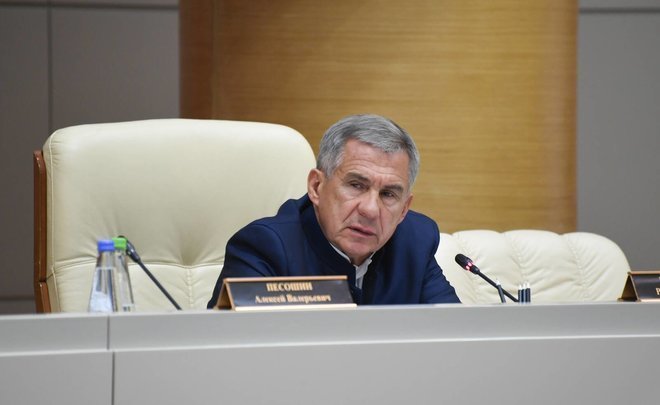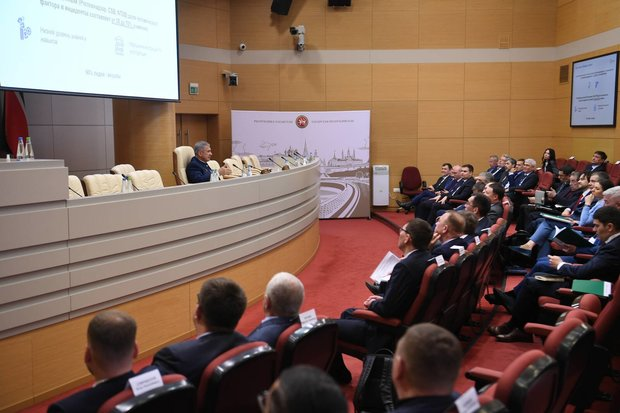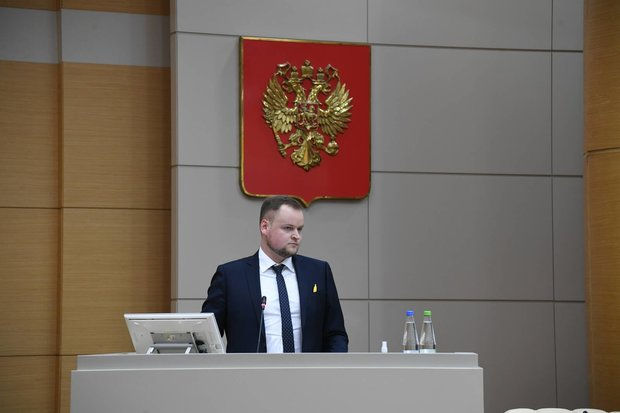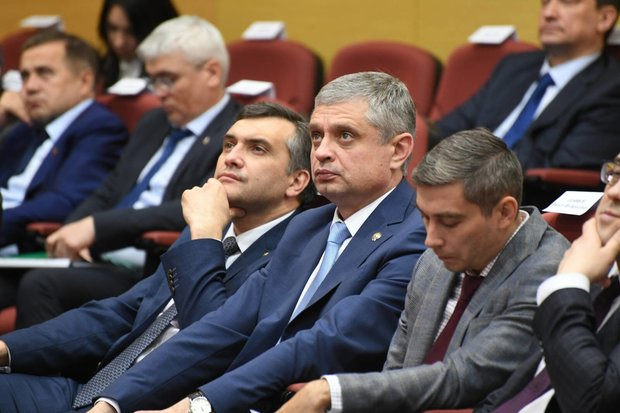Rustam Minnikhanov: ‘What you’ve told us is tempting, we will work with you’
The Tatarstan rais ordered to spread Tenlab’s staff training system in colleges and continue oil desulphurisation experiments

The impending crisis in petrochemical exports doesn’t reduce the interest in new effective developments for the real sector of the economy. “We know what all this is done for, we’ve learnt a bit,” Rustam Minnikhanov asked speakers to be brief at a board meeting of Tatneftekhiminvest-holding on 27 April. “Tell me, what’s your novelty? Are the technologies different, are they cheaper or what?” As a result, Fosagro’s silicon fertilisers, Zelenopol’s cheap oil desulphurisation know-how technologies and fire-resistant coating.
Halted export?
The performance of enterprises of the Tatarstan gas and petrochemical complex in the first quarter of this year became the main item on the agenda of the April board meeting of Tatneftekhiminvest-holding. As it was expected, Director General of Tatneftekhiminvest-holding Rafinat Yarullin’s report was behind closed doors. This became a common practice since the petrochemical sector started to have difficulties with sales in foreign markets. Seemingly, the situation only aggravated with the imposition of European sanctions. Restrictions on exports of polymer, methanol and other petrochemical products weren’t slow to influence production volumes earlier this year.
According to the information of the holding, oil production rose by 3.7%, detergent production did by 3.5%, nitrogen fertilisers — by 2.6%. A significant rise — by 22% at once — was only in motor fuel production. Oil processing, diesel fuel, ethylene, car tyres, non-armoured tile and film production are stagnating — they remained at the level of the first quarter of 2022.
Rubber production collapsed the most — by 37%, straight-ran gasoline output decreased by 31%. It is rumoured that the petrochemists are surviving thanks to ethylene and plastic supplies. Production volumes are expected to increase this summer after a halobutyl rubber plant with a capacity of 50,000 tonnes opens at NKNK. The sector really hopes the growth dynamics will recover thanks to state support measures.

“This April, the Russian government has approved 13 priority areas for technological sovereignty projects. Mid- and small-scale chemical production, a total of 38 groups of chemical products, account for most of the list. The projects are planned to qualify for state support measures,” the holding noted.
“100 grams per 1 ha of land is enough”
Moscow guests’ presentation took place in the public part of the meeting. Fosagro’s innovation centre focuses on silicon fertilisers in agriculture, this is why its representative Dmitry Dorofeyev persuaded the audience into switching to their use. According to him, the use of silicon products increases plants’ resistance to stressful conditions and fertilisers help raise land fertility.
Silicon fertilisers are rather improvers and biostimulators. Dmitry Dorofeyev says that improvers enhance soil porosity, lightness of land, keep moisture. They are divided into three groups: improvers (up to 10 tonnes per hectare), fertilisers — from 50 kg — and biostimulators — up to 10 kg per hectare. These are absolutely new agricultural chemicals that are highly effective with a low dose. They save plants from stress that can lead to their death. This year, the company has launched a new product based on monosilicon acid according to Apasil technology. It is considered to be 3rd hazard class with unlimited shelf life. The lowest yield improvement is 6-7%, the highest — up to 84% for fruits and berries.
“Is 100 grams per hectare enough?” Rustam Minnikhanov asked again with some distrust.
“Yes, the powder is dissolved in 300 litres of water,” Dorofeyev confirmed.

It turned out that Tatarstan had already been experimenting with this novelty. An experiment on using silicon is done in Almetyevsk and Cheremshan districts.
“There is no explosive effect yet, we are working according to weather conditions. We will be using it again this year. The product is interesting, we can use it in the agrarian university as a pilot project,” a representative of the Tatarstan Ministry of Agriculture said.
The Tatarstan rais ordered to prepare stands with silicon fertilisers by the Field Day.
Oil desulphurisation experiments
Executive Director of Maxinvest company from Moscow Yegor Spiridonov presented an oil desulphurisation technology with the help of electromagnetic fields. The reduction of sulphur content in oil is the main requirement for oil refineries, also, the oil price depends on sulphur content. Sulphur mustn’t exceed 0.5% in oil and oil products since 1 January 2020, he reminded the audience. Traditional methods are not very effective for sulphur residue desulphurisation. Maxinvest offers to reduce the sulphur content with the help of a special reactor that is built in a test unit.
Desulphurisation experiments were done at the Mary refinery, petrochemical plants of Lukoil-Nizhegorodnefteorgsintez and Slavneft-Yaroslavneftorgsintez. Sulphur content in tar reduced from 3.5% to the standard 0.5% here. Tests have recently been done with carbon oil for a small oil company of Robert Fassakhov’s TatOilGaz where sulphur in oil is 4.6% whereas refined oil has 1,59%, Spiridonov said. Also, there have been done experiments with diesel and furnace fuel, oil coke desulphurisation for Lukoil and Bashneft. Representatives of oil companies of Tatarstan said that Tatneft and TAIF-NK cooperated with this company.
“The concentration was lowered to 0.1% in test samples. But when we asked to see how this happened in practice, there was no dialogue,” a representative of the Fuel and Energy Complex said.
The Tatarstan rais asked about costs per tonne of oil. “Your costs on oil desulphurisation is the cost of 1 kWh and consumables at the price of salt,” the speaker said. “What you have told us is tempting, we will work with you,” Minnikhanov said and ordered to create a task force.

“The maximum fire resistance is up to 180 minutes, for flexible foundations, it is up to 300 minutes”
The presentation of fire-resistant and heat insulating coatings developed by Zelenopol from Moscow was received with great interest. Vice Director of the company Grigory Isayev presented several types of products for housing and industrial facilities with different hazard categories.
“The coating performs amazingly for all structures in different shapes,” he praised.
The speaker presented coating samples to Rustam Minnikhanov. “Metal structures burn within minutes. How much does fire resistance increase after paining with fire-resistant paint?” the speaker was asked.
“The maximum fire resistance is up to 180 minutes, for flexible foundations, it is up to 300 minutes,” Grigory Isayev answered.
“Tell us about the price too then, how much is it?” Minnikhanov was interested. “This is a necessary matter, we will send people to you, the housing services are now renovated on a large scale.”
In conclusion, a start-upper from Innopolis, founder of Tenlab company, Vasil Kayumov delivered a speech. He presented training systems, simulators and equipment to train and test staff that uses complex high-tech equipment. The training consists in improving equipment management skills in realistic panoramas downloaded into the computer or even into the phone. The student goes through all management stages like in a game. According to the speaker, they chose this method because 90% of people perceive information visually better.

“Today training and briefing for workers is done formally, without visualisation, which is expensive and ineffective. This leads to accidents. The human factor in industrial incidents is from 35 to 70%,” he said citing data of Russia’s industrial safety watchdog.
“Tell me, what’s your novelty? Are the technologies different, are they cheaper or what?”
“Fine, let’s switch to the most delicious part,” Vasil Kayumov agreed.
He said that the prime cost of training will cost 800,000 rubles with one compressor and it will pay back in three months: “This device based on our own software doesn’t depend on foreign vendors. There have been implemented several pilot projects, at SIBUR in Perm, at Biaxpalen in Nizhny Novgorod, a simulator is now engineering for Inter RAO for workers of the Perm Hydro Power Plant.”
“If SIBUR gives you a good recommendation...” Minnikhanov noted and ordered to spread the staff training system at colleges.”